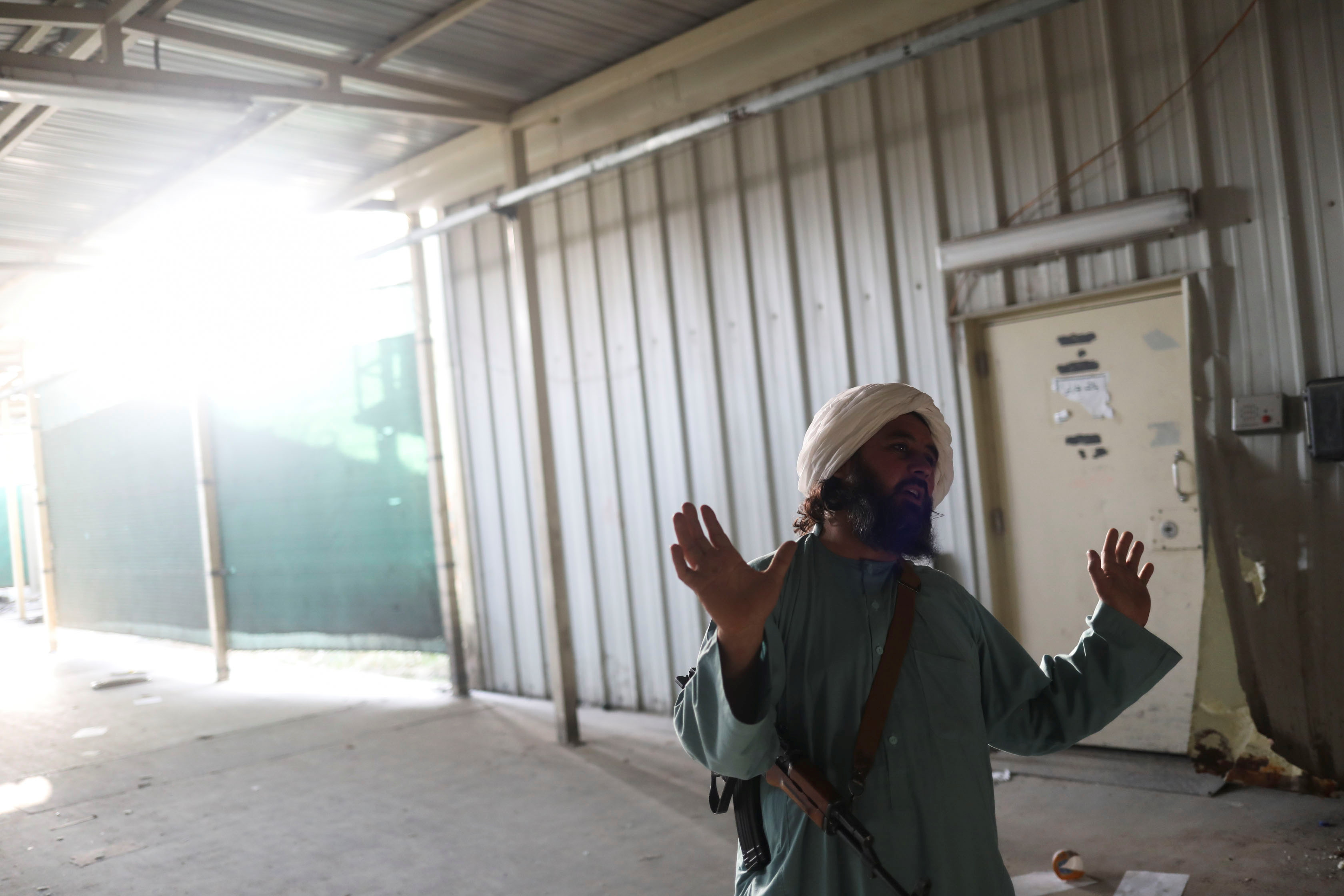Arab Gulf States and the Situation in Afghanistan
Arab state authorities are refraining from making unequivocal declarations about the future of relations with Afghanistan after the Taliban took power. The priority of the Arab leadership in the Persian Gulf will be to prevent the destabilisation of Afghanistan and to influence the Afghan government policy towards terrorist organisations. Given the convergence of EU and Arab state goals related to countering the threat of terrorism in the country, the Union could include them in the announced regional platform for cooperation on Afghanistan.
 Photo: Wana News Agency/Reuters
Photo: Wana News Agency/Reuters
After the Taliban took power in Afghanistan in August, the Arab states of the Persian Gulf announced their intent to support the stabilisation of the state and warned about the possible strengthening of regional terrorist groups. Saudi Arabian authorities stressed the importance of allowing Afghans to make their own political choices without outside intervention. Qatar warned that isolating the Taliban could further destabilise Afghanistan. The United Arab Emirates (UAE) launched an air corridor to deliver humanitarian aid to Kabul. While Arab state leaders have refrained from making clear statements, their reactions indicate that they will be willing to cooperate with the Taliban if they commit to fighting terrorist organisations. The Arab states also supported the evacuation of foreigners and Afghans at risk: 28,000 people were evacuated through the territory of the UAE, and about 43,000 through Qatar. Additionally, on the U.S. air base in Qatar, on the principality’s initiative, a field hospital was established. Assistance in the transport of fleeing Afghans and foreigners was an opportunity to build the image of the Gulf states as engaging in humanitarian crises and to consolidate their position as reliable partners of Western states.
Relations with the Taliban
In 1997, during the first period of Taliban rule in Afghanistan, the UAE and Saudi Arabia were the only other countries in the world besides Pakistan to recognise the Islamic Emirate of Afghanistan. However, they severed ties with the Taliban in 2001 after the 9/11 attacks in the U.S. At that time, the Gulf Cooperation Council (GCC) states became involved in the NATO operation in Afghanistan, which resulted in the creation in 2004 of the Istanbul Cooperation Initiative for dialogue on security issues between NATO and the GCC. Following the overthrow of the Taliban, Saudi Arabia backed the new government of Hamid Karzai, becoming one of the largest donors financing development and humanitarian projects in Afghanistan. It also acted as a mediator in the government’s conflicts with the Taliban. In turn, the UAE was one of the most important foreign investors in Afghanistan in the first decade of the 21st century, and the number of Afghan immigrants in the Emirates reached 150,000 in 2016. Both countries wanted to counterbalance the growing influence of Iran in Afghanistan.
Despite the efforts of Saudi Arabia and the UAE to act as intermediaries in the mediation between the Taliban and the United States, Qatar played that role thanks to its positive relations with other Islamist groups, such as the Muslim Brotherhood and Hamas. In 2011, the Obama administration approved a plan to open a Taliban political office in Doha, which eventually happened two years later. Its main function was to facilitate the peace negotiations between the Taliban and the Afghan government and the U.S., which has its largest military base in the Middle East in Qatar. Participation in the negotiations allowed Qatar to maintain the key role of intermediary in relations with Afghanistan and to maintain its influence in that country. This was indicated by the September visit of Muhammad bin Abdulrahman Al-Thani, the chief of diplomacy of the principality in Kabul. It remains the highest-ranking meeting of a representative of the Arab state with the Taliban.
However, no Gulf State has officially recognised the Taliban government. Their caution is due to several factors. First, for both the UAE and Saudi Arabia, Islamist groups remain one of the greatest threats to the stability of the ruling monarchies. Therefore, cooperation with the Taliban would run counter to the rhetoric that the monarchs are hostile to such groups and to their efforts to modernise customs and limit the role of religious authorities. Second, open cooperation and support for the Taliban, irrespective of their level of respect for human rights, may risk U.S. sanctions. This could jeopardise the efforts to transform the Gulf states’ economies. For this reason, the Gulf leaders stress the importance that the new Afghan government be inclusive. Third, in recent years, the Taliban has partnered with Iran, Saudi Arabia’s main regional rival. In return for the Taliban pledging to end the repression of Afghanistan’s Shiite minority (about 25% of the population), the Iranian Islamic Revolutionary Guard Corps trained its militants, and the Iranian authorities promoted a positive image of the Taliban. Saudi Arabia and the UAE may try to limit the influence of not only Iran but also Turkey and Qatar in Afghanistan because of their close contacts with Islamist groups.
Problem of Non-state Actors
Hamas, Hezbollah, the People’s Mobilisation Forces (PMF) in Iraq, and the Yemeni Houthis view the situation in Afghanistan as “an end to foreign occupation” and a warning against cooperation with the U.S. The chaotic American withdrawal from Afghanistan and the success of the Taliban in taking over the country reinforce the belief that militant actions destabilising a country can force the U.S. to leave and allow these groups to seize power. The strengthening of paramilitary groups is particularly significant in the context of the U.S. plans to withdraw troops from Iraq. The fear of an ISIS revival in Iraq may further increase Iraqis’ sympathy towards the PMF—Iranian-linked militias that took part in combating ISIS while resisting integration with the Iraqi army—which will further destabilise the country.
The Gulf states authorities’ belief that the U.S. involvement in the dialogue with the Taliban has increased the legitimacy of extremist organisations will motivate their efforts to become independent from U.S. security support and to strengthen their own capabilities. The success of the Taliban and their potential cooperation with Islamist Arab organisations threaten the stability of the Persian Gulf. The establishment of relations with the Taliban by the leaders of the Arab Gulf states may give them a tool to pressure them not to cooperate with Islamist groups and to share information about them with Arab governments. The will for such cooperation is indicated, for example, by the meeting in the capital of Qatar in September this year of the former head of Saudi intelligence, Prince Turki Al-Faisal, with Mullah Muhammad Yaqoob and Abdul Ghani Baradar, who soon became the new deputy prime minister of Afghanistan.
Conclusions
The priority of the leadership of the Arab Gulf states is to prevent further destabilisation in Afghanistan. To curb it, Arab rulers are likely to forge ties with the Taliban-led government. The prior relations with the Taliban will facilitate this for the leaders of influential countries such as the UAE and the Saudi Arabia. However, given the Gulf monarchs’ efforts to achieve economic transformation, the success of which also depends on cooperation with Western countries, their relationship with the Taliban will remain limited. The main goal of the Arab rulers will be to press Afghanistan to combat terrorist organisations such as Al-Qaida and not to shelter affiliates of Islamist groups that are a threat to their power. This may include offers of investment or support for the reconstruction of the state. The consequences of the changes in Afghanistan may reduce the motivation of the UAE and Saudi Arabia to continue the dispute with Qatar. The principality, thanks to its role in the talks with the Taliban, will remain an important intermediary in contacts between the new government of Afghanistan and other countries, which will be an argument against the repeated attempts to isolate it in the region.
The chaotic U.S. withdrawal from Afghanistan and the Taliban’s rapid seizure of power will strengthen the Arab leadership’s belief that they cannot rely on American security support. The decreasing importance of the U.S. in the regional order will mean further consolidation of the cooperation of Arab autocrats, who maintain that the durability of their power guarantees the stability of the region. At the same time, the concerns of Arab rulers related to the possibility of international extremist organisations strengthening in Afghanistan may be an impulse to tighten relations with the EU and NATO as part of the Istanbul Cooperation Initiative. The EU could include Saudi Arabia, the UAE, and Iraq in the regional platform for cooperation on Afghanistan announced by the EU High Representative for Foreign Affairs and Security Josep Borrell. This cooperation could also include the development of a joint plan in the event of a sudden wave of migration from Afghanistan.


